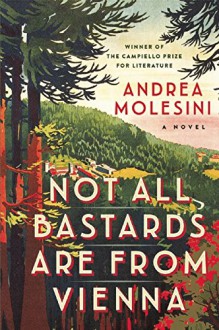
Thank you to Macmillian-Tor/Forge for providing me with an egalley copy of this book to review.
“Vienna: A Novel” was a book I was really looking forward to. I didn’t realize initially that it was a female-female romance but it was a good way of getting out of my comfort zone when it comes to reading. Also, the reviews and praise that “Vienna” is very much like a modern Sherlock Holmes story, but with both protagonists being female, were difficult to ignore. And so I dived in, hoping to find another wonderful mystery-solving duo.
It didn’t quite turn out that way. In fact I felt a little saddened after finishing the book and going back and rereading some of the praise people had for this book. Depending on the author’s original intentions, if “Vienna” was supposed to be a modern salute to such a beloved classic, then it fell quite short of the mark. Justine and Vienna lacked a lot of dynamic between them, and the choppy dialogue didn’t help. Often I couldn’t tell who was speaking, or what they were even discussing. I could tell Justine was supposed to be an example of a rich, beautiful model who was also secretly very intelligent, but she didn’t work for me. I found her comments towards Vienna to be often too harsh and unnecessary, quite exaggerated if the author was going for that kind of personality. There were times when she slightly redeemed herself, especially her dialogue with Lord Davy in London, which made me chuckle and admire, for once, her impressive sarcastic gymnastics. Otherwise I didn’t like her much, but considering she’s the main character there’s nothing to do but deal with it and keep reading.
Vienna was the only redeeming part of this whole book. I saw myself in several aspects of her personality and that made it easy to follow along with her actions, both in terms of how she approached the case and how she responded to Justine. Kirby did a solid job in delivering the spirit of her character and establishing a connection between Vienna and the reader. However I did often wonder just who was the “head” of the duo and who was the torso, and Vienna acted, most often, like the Watson equivalent due to her confusion towards Justine’s actions. Her mind placed her as a Sherlock though, so again I wondered about the author’s intentions when writing this book.
Besides that however the story was nothing amazing nor entirely interesting. I didn’t understand what the big deal about the case was, and found it to be rather poorly explained. I went on my own mini mystery solving adventure, trying to reread passages and look for clues to figure out just what was going on, what the story about the manikins was, and so on. Often Vienna’s rambles would get in the way and act as a torrent of information that difficult to separate from the main mystery-related facts. Details like the way in which they cracked the code went over my head, and the “resolution” to the mystery was quickly crammed into the very end of the book, taking up a couple of pages with a hazy explanation that had name-dumping of characters I couldn’t keep track of earlier and most certainly didn’t know how they related to the case.
In conclusion, “Vienna” reads more like a character study of our main character, Vienna, as opposed to a murder mystery/ancient treasure hunt. The case was, to put bluntly, boring and difficult to follow, with a disappointing conclusion and a dynamic duo that lacked good chemistry that could parallel some of the modern-day literary detectives. Overall a disappointment, although a good experience nonetheless, although now I shall be more warry when I see summaries praising books as being good modern-day tributes to Conan Doyle’s “Sherlock”; very few have lived up to those big words so far.


 Log in with Facebook
Log in with Facebook 









